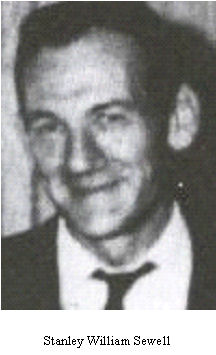

A GEORGE CROSS FOR A SEWELL MUNITIONS WORKER
This article was originally published in the August 2011 edition of Soul Search, the journal of The Sole Society
 Sole
Society member Stephanie Summer’s uncle was Stanley William Sewell, who in 1940
was awarded the George Cross, the highest civil citation in the UK. Stanley was
born on the 16th December1906, in Enfield, Mdx. He was the eldest child of
William (1882 in Nazeing Essex) and May Florence Sewell. His grandparents were
William and Sarah. William senior was born in Great Munden, Hrt in 1847. William
and Sarah had moved from Hertfordshire about 1880 firstly to Nazeing in Essex
and then the family had settled in Enfield, Mdx
Sole
Society member Stephanie Summer’s uncle was Stanley William Sewell, who in 1940
was awarded the George Cross, the highest civil citation in the UK. Stanley was
born on the 16th December1906, in Enfield, Mdx. He was the eldest child of
William (1882 in Nazeing Essex) and May Florence Sewell. His grandparents were
William and Sarah. William senior was born in Great Munden, Hrt in 1847. William
and Sarah had moved from Hertfordshire about 1880 firstly to Nazeing in Essex
and then the family had settled in Enfield, Mdx
Stanley William in WW2 was working at the Royal Gunpowder factory in Waltham Abbey, as an explosives worker, known as a Hillman. Waltham Abbey had been producing gunpowder from at least the 17th century, and later it became the leading English producer. In WW2 it was the sole producer of RDX (Research Department Explosives), a nitroamine, used in the bouncing bomb.
The following report is from the London Evening Gazette, 6th February 1940: ‘The work was highly dangerous and on the 18th January 1840 there was an explosion in the Nitro glycerine mixing house which handled frozen nitro glycerine, killing five men. Stanley was working 150yards away in another building, which was also damaged by the explosion. Stanley and fellow worker Leo O’Hagan were engaged in the nitration of glycerine at the most critical stage in the process of manufacture when the liability to detonation is greatest. Over 1,000lbs of nitro glycerine was under process and in a condition of instability. The hot water and air services, whereby the process is carried out, had been cut off by the explosion.
Realising the danger to life and property which would be caused by a further explosion, they stood by their posts for some two hours until services were restored and then calmly continued with their work until the whole charge had been brought to a state of stability. Had they fled to safety, it is highly probable that the charge of nitro glycerine under their care would have been destroyed. This would have caused more wide-spread damage and loss of life with further delay in resumption of production in the factory.
The citation for their award says that both men showed great gallantry and devotion to duty, and complete disregard for their personal safety. Mr Burgin, the Minister of Supply, commended the men. “By their courage, discipline and determination these men unquestionably prevented the explosion from spreading and saved buildings with vital supplies and their lives of their fellow workers.” The men together with William George Sylvester, who was working in a nearby hut, were awarded the Empire Gallantry Medal (EGM)’
However in September 1940, King George V1 decided that in recognition of the many heroic acts by civilians the EGM would become the George Cross. Stanley was able to therefore exchange his EGM for the George Cross later that year.
The factory at Waltham Abbey closed after the war in 1945 and the site finally closed in the early 1990’s later to reopen as a museum. Stanley died in 1965 and sadly his medal was sold in 1995.
Thanks to Stephanie Summers
Editor: It looks like Stanley’s place of work is now open to the public, see www.royalgunpowdermills.com/